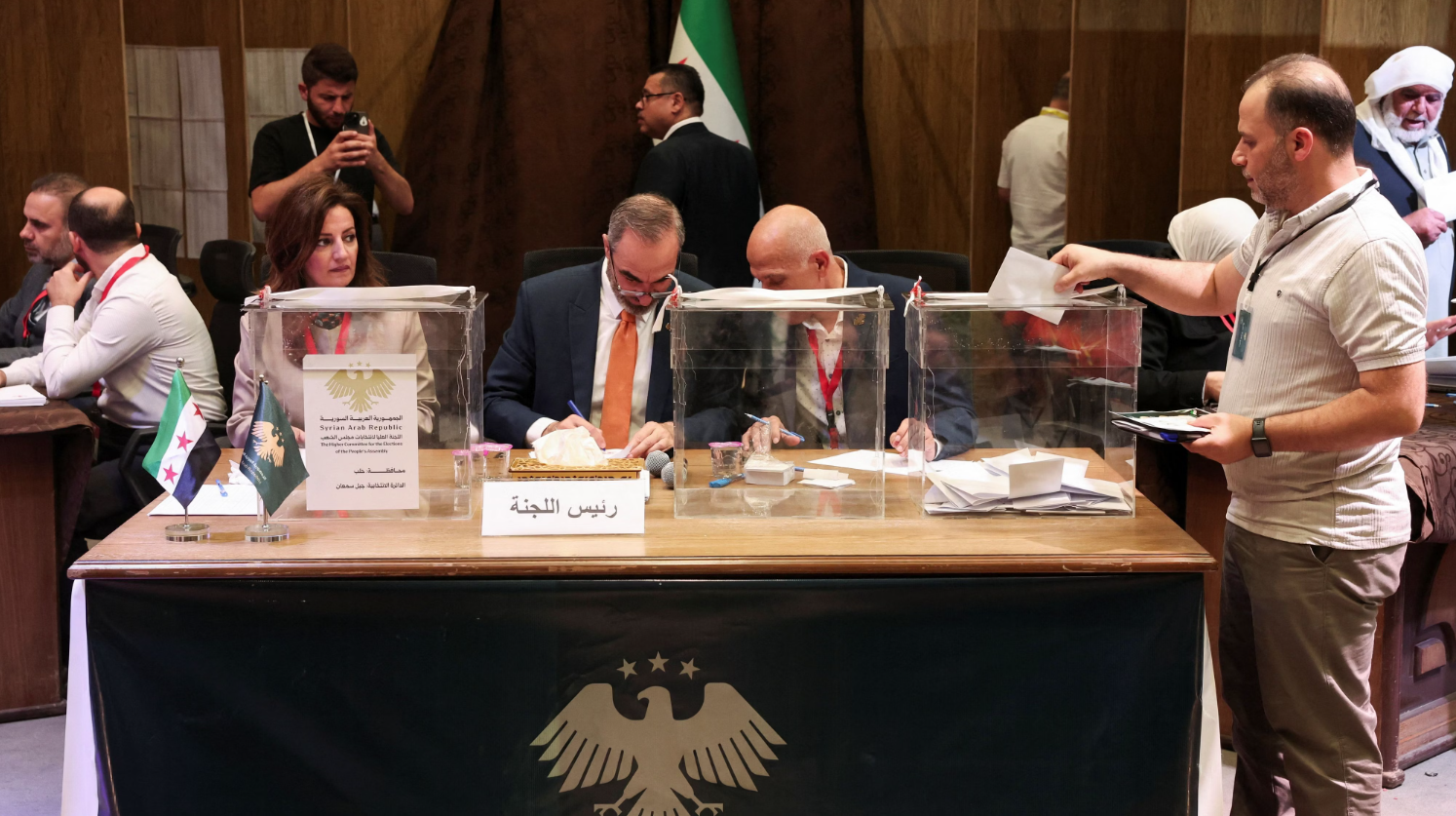Syria’s parliamentary Election: A Precarious Start to Democracy
Hwang Yuihyun (SNUAC)
On October 5, 2025, Syria held its first parliamentary election since the fall of the Bashar al-Asad regime. Due to challenges with voter identification and polling station operations, the election was not conducted directly by voters. Instead, the election was held indirectly. The 11-member High Commission, appointed by the president from among politicians participated in the anti-Asad activities, civil society activists, and government figures, formed local councils in each region. These councils vetted and approved the 6,000-member electoral college. Of the 210 members of the council, 140 were elected through indirect voting, while the remaining 70 were nominated by President Ahmad al-Sharaa. Approximately 1,500 candidates were recognized and ran for office.
Elections were scheduled to be held nationwide in Syria. However, voting was postponed in the Kurdish governorates of Raqqa and Al-Hasaka, under the control of the Kurdish authority in confrontation with the central government, and in the southern province of Suwayda, where conflict between the government and the Druze continues. As a result, 119 candidates were elected, excluding those three governorates. No political parties participated in the elections, and all of the elected candidates were independents.
While the general election, a first step toward a transition of power, is a positive development, concerns remain about the potential for democratic transformation. The government’s argument that the lack of infrastructure for direct elections necessitated the introduction of an indirect election system is generally accepted, and the diverse composition of the electoral commission, including two women, anti-government politicians, and opposition activists is positively evaluated. However, criticism also lingers that the electoral college, formed by a presidentially appointed electoral commission, lacks democratic legitimacy and fails to fully reflect public opinion.
The way the president appoints one-third of the legislature has also sparked controversy. Under the current interim constitution, the parliament requires the consent of two-thirds of its members to override presidential decrees. However, if even one-third of the president’s appointees oppose the vote, the parliament will struggle to effectively exercise its checks and balances. The fact that only six of the elected members are women and ten are from minority religious groups, including Christians, Alawites, and Druzes has also raised concerns that these groups’ positions could be marginalized during the transition. The Syrian government acknowledged the low representation of women and minority groups in the election results and stated that it would address this issue when the president appoints members.
시리아 총선, 민주화를 향한 불안한 출발
황의현 (아시아연구소)
2025년 10월 5일 시리아에서 바샤르 알아사드(Bashar al-Asad) 정권이 붕괴한 이후 처음으로 총선이 치러졌다. 유권자 신원 확인과 투표소 운영 등 선거 관리 인프라 미비 문제로 인해 총선은 유권자의 직접 투표가 아니라 아사드 시기의 반정부 정치인, 시민사회 운동가, 정부 인사 가운데 대통령이 임명한 11명으로 구성된 선거관리위원회가 지역마다 지방위원회를 구성하고, 지방위원회의 심사를 거쳐 승인된 선거인단 6,000명이 의원을 선출하는 간접 투표 방식으로 치러졌다. 총의원 210명 중 140명이 간접 투표로 선출되며, 나머지 70명은 아흐마드 알샤르아(Ahmad al-Sharaa) 대통령이 지명한다. 약 1,500명이 후보자 자격을 인정받아 출마했다.
선거는 시리아 전국에서 치러질 예정이었지만, 중앙정부와 대립하는 쿠르드 자치정부 지역인 라카(Raqqa)와 알하사카(Al-Hasaka)주(州)와 정부와 드루즈파(Druze) 사이의 분쟁이 이어지는 남부 수웨이다(Suwayda) 주에서는 투표가 연기되어 결과적으로 세 주를 제외하고 총 119명이 당선되었다. 선거에 참여한 정당은 없으며 당선자는 모두 무소속이다.
정권 이양을 위한 첫 단계로서 총선이 치러진 것은 긍정적 변화지만, 민주주의 정착 가능성에는 여전히 회의적인 우려가 제기된다. 직접 선거를 치를 기반 시설이 없어 간선제를 도입할 수밖에 없었다는 정부의 주장은 전반적으로 수용되었고 선거관리위원회가 여성 2명과 반정부 정치인, 야권 운동가 등 다양성을 고려해 구성되었다는 점도 긍정적 평가를 받았지만, 대통령이 지명한 선거관리위원회를 통해 선거인단이 구성되는 선거 방식이 민주적 정당성이 부족하며 국민의 온전한 여론을 반영하지 못한다는 비판도 크다.
대통령이 총의원의 1/3을 임명하는 방식도 논란을 야기했다. 현행 임시헌법에 따르면 의회가 대통령령을 무효화 하려면 의원 2/3의 동의가 있어야 하지만, 대통령이 지명한 의원 1/3이 반대한다면 의회가 제대로 견제 역할을 하기 어렵기 때문이다. 당선자 중 여성은 단 6명, 기독교도, 알라위파, 드루즈파 등 소수 종교 집단은 10명에 불과하다는 점 역시 이들의 입장이 정권 이양 과정에서 배제될 수 있다는 우려를 야기했다. 시리아 정부는 선거 결과에서 여성과 소수 집단 의원이 적다는 점을 인정하고 대통령이 의원을 지명할 때 문제를 보완할 것이라고 밝혔다.

